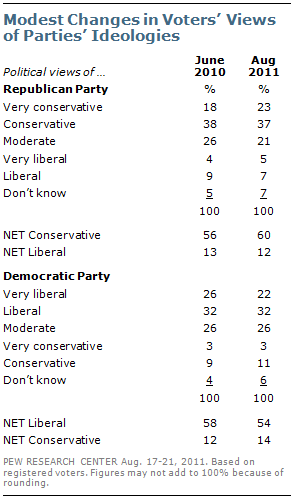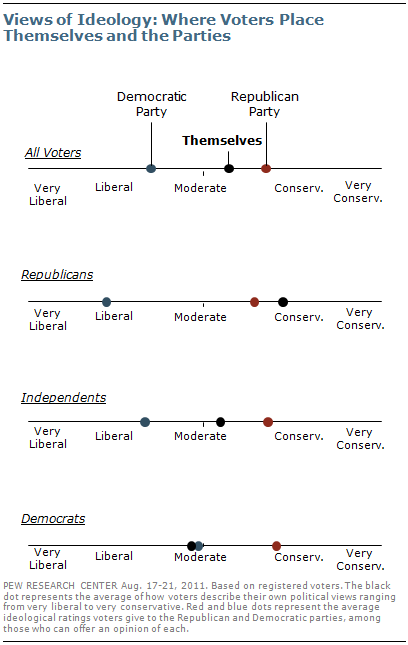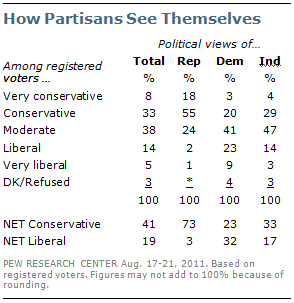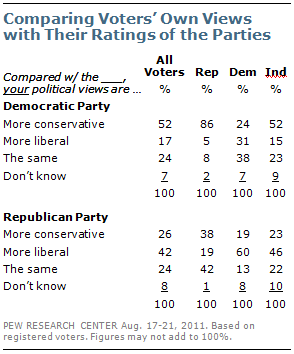Overview

Though voters’ views of the ideologies of the political parties have shifted little since the summer of 2010, an increasing number see the Republican Party as very conservative, while slightly fewer see the Democratic Party as very liberal.
In 2010, somewhat more, on balance, viewed the Democratic Party as very liberal than said the GOP was very conservative (26% vs. 18%). Currently, nearly identical percentages view the Democratic Party as very liberal and the Republican Party as very conservative (22%, 23% respectively).
This trend notwithstanding, many Republicans’ own ideological assessments fall to the right of the assessments they give to the GOP. Nearly four-in-ten (38%) Republican voters rate own ideology as more conservative than their impression of the Republican Party’s ideology.
Overall, perceptions of the parties’ ideologies are little changed from June 2010. Six-in-ten (60%) say the Republican Party is either very conservative or conservative, while 54% say the Democratic Party is either very liberal or liberal. In June 2010, 56% saw the GOP as conservative or very conservative and 58% saw the Democrats as liberal or very liberal.
The latest survey by the Pew Research Center for the People & the Press, conducted Aug. 17-21 among 1,509 adults (1,205 registered voters), finds that voters’ descriptions of their own political views also are little changed. Roughly four-in-ten (41%) say they are either very conservative (8%) or conservative (33%), while about half as many (19%) say they are either very liberal (5%) or liberal (14%); another 38% describe themselves as moderate.

Looking at the ideological perceptions of the parties and voters’ descriptions of themselves, voters on average place themselves just right of center and slightly closer to the Republican Party than to the Democratic Party.
Republican voters see themselves as somewhat more conservative than they see their party – and they see the Democrats as solidly liberal. These perceptions are amplified among Republicans and Republican-leaning independents who agree with the Tea Party.
Democrats, by contrast, view their party’s political views as moderate. On average, Democrats’ own ideological assessments place them close to the middle of the political spectrum.
Partisans Rate Their Own Ideology

A large majority of Republican registered voters (73%) describe their political views as either conservative (55%) or very conservative (18%). About a quarter (24%) say their views are moderate, while very few (3%) say their views are liberal or very liberal.
Among Republicans and Republican-leaning independent voters who agree with the Tea Party movement, 84% say they are either conservative (61%) or very conservative (23%); just 14% describe their views as moderate. Republicans who disagree or have no opinion of the Tea Party are more divided: 51% say they are either conservative (44%) or very conservative (7%) and 41% see themselves as moderate.
Among Democrats, 41% describe their views as moderate, 32% say they are liberal (including 9% who say they are very liberal) and 23% say they are conservative.
Nearly half of independents (47%) say their political views are moderate, about the same as last year. The remainder tilt conservative, with 33% saying they are either conservative (29%) or very conservative (4%); 17% say their views are either liberal (14%) or very liberal (3%).
Many Republicans Place GOP to the Left of Their Own Views

Voters were asked to rate their own political views – and the parties’ political views – on the same scale, from very conservative to very liberal. This makes it possible to compare voters’ own views with their assessments of the parties’ ideologies.
As in June 2010, about half of registered voters (52%) rate their own political views as more conservative than the rating they give the Democratic Party. Fewer voters (42%) see their own ideology as more liberal than the Republican Party’s.
Many Republican voters – particularly those who agree with the Tea Party – place themselves to the right of the GOP ideologically. Nearly four-in-ten Republican voters (38%) rate their own views as more conservative than the Republican Party’s. Just 19% see the GOP’s views as more liberal than their own, while 42% say the Republican Party’s ideology is about the same as their own.
Among Republicans and Republican-leaning voters who agree with the Tea Party, half (50%) place the GOP’s political views to the left of their own. Just 11% see the GOP as more conservative while 37% view the Republican Party’s views as similar to their own. By contrast, just 23% of Republicans and Republican leaners who do not agree with the Tea Party rate the GOP’s ideology as more liberal than their own, while 42% say the party’s views are about the same as their own and 33% see the GOP’s ideology as more conservative than their own.
Democratic voters are about as likely as Republican voters to say their own views are similar to their party’s (38% of Democrats, 42% of Republicans). Comparable percentages of Democrats say their own views are more liberal (31%), or more conservative (24%), than the party’s.